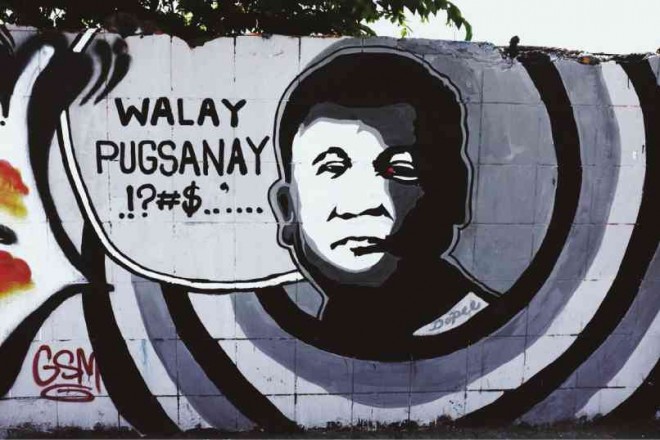
WALL MESSAGE “Walay pusganay” (Don’t force me) reads a message on a wall in Davao City with a sketch of Mayor Rodrigo Duterte in what seems to be an attempt to portray the tough-talking politician’s statement that he should not be forced to run for President in 2016. KARLOS MANLUPIG/INQUIRER MINDANAO
DAVAO CITY—“Am I the death squad?” Mayor Rodrigo Duterte asked during his weekly TV program “Gikan sa Masa, Para sa Masa” here on Sunday. He added: “True. That is true.”
But Duterte explained that the “admission” was meant to challenge human rights organizations to go to Davao City and pursue their allegations that he is involved in the so-called Davao Death Squad (DDS), a vigilante group believed to be behind the spate of killings of suspected drug traffickers and other criminals in the city.
“There’s no need for you to go to the Ombudsman. There is no requirement that you go to the human rights. File directly in court. Then I’ll place you under oath. Just execute an affidavit,” he said.
In Manila, the Commission on Human Rights (CHR) said it would look into Duterte’s statement in the TV program that he was maintaining links to the notorious DDS. “We are very concerned about the mayor’s statements, as if he has impunity,” its executive director, Marc Titus Cebreros, said.
“We will write him to ask him to confirm what he said before the media. It will be part of due process to hear his side,” Cebreros said in an interview on Monday.
According to the New York City-based Human Rights Watch, 1,000 killings attributed to the DDS have been reported in Davao City since the late 1990s.
Justice Secretary Leila de Lima also denounced Duterte’s threats.
“Those statements of his at the very least are annoying and definitely disturbing. I mean, what kind of statements are those? We will be the laughing stock of the international community if we agree with his views,” De Lima told reporters in an interview.
In 2012, the CHR recommended the filing of a case against the tough-talking mayor for command responsibility, noting that he exercises power over the local police.
Duterte, a lawyer and government prosecutor before he became mayor, said he would cross-examine the human rights leaders himself “and I will show the world how stupid you are.”
Though he did not directly admit or deny his links to the death squad, he continued to warn criminals all over the country.
Amid efforts by some sectors to groom him as a presidential candidate in the 2016 elections, Duterte said he was not coveting the presidency but told criminals that they should already start hiding once he wins.
“I would kill all of you who make the lives of Filipinos miserable,” he said, adding that the number of deaths might reach 50,000, even 100,000. “I do not want to commit a crime. But if by chance God will place me there, magbantay kayo (be on guard).” he said.
Duterte is presently going around the country and, lately, in Hong Kong, for a “listening tour.” The events, which supposedly are part of a campaign for federalism, consistently transform into a gathering of people and groups egging him to seek the presidency.
Human Rights Watch has said that Duterte should be investigated for his “possible role” in the summary executions.
“The Philippine government should take a zero-tolerance approach to any public official who publicly endorses extrajudicial killings as an acceptable means of crime control,” said Phelim Kine, deputy Asia director at Human Rights Watch.
Kine said Duterte’s public statements in favor of vigilantism was already enough for the government to start an investigation.
The CHR executive director said the agency would consider the mayor’s statement in his TV program on Sunday as a new development about the DDS, which it previously investigated in 2012.
While the statement can not be considered an admission in a legal sense, Cebreros said it would view it as a new lead about the issue for follow-through actions.
As a public official, Duterte is duty-bound to respect and comply with the country’s laws, which include not killing someone who is a suspect of a crime, Cebreros said. “It is his duty to comply with the law, and this tough attitude of Duterte is being emulated in other places.”
He cited other vigilante killings in the cities of Tagum, Cagayan De Oro, General Santos and Zamboanga, as well as parts of Luzon. He said the CHR was alarmed that the killings were becoming “normal” and contributing to a “climate of fear.”
“Maybe he thinks that because there is freedom of speech, he can say those things … . But it’s not a simple matter of going public and projecting a tough image. Rights are being violated,” the CHR official said.
Kine said “extrajudicial killing and death squads are absolutely uncontrollable in their abusive approaches.”
“Death squads are crimes, they are a criminal organization. They are not the solution to prevent crimes,” he said.
Cebreros urged the Department of the Interior and Local Government and the Office of the Ombudsman to take action on Duterte’s recent statement. With a report from Jerome Aning in Manila